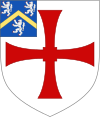Institute of Advanced Study (Durham)
 The institute is housed in Bishop Cosin's Hall | |
| Established | 2006 |
|---|---|
| Address | Cosin's Hall, Palace Green, Durham, DH1 3HB |
| Location | 54°46′28″N 1°34′30″W / 54.77444°N 1.57500°W |
| Affiliations | Durham University |
| Website | https://www.dur.ac.uk/ias/ |
| Map | |
The Institute of Advanced Study (IAS) is an interdisciplinary research centre of Durham University. The IAS - set up to mark Durham's 175th anniversary - is intended to attract scholars and public figures from across the world to collaborate on 'agenda-setting research'.[1] It is housed in the Grade II* listed Bishop Cosin's Hall, an early 18th century building on Palace Green, Durham, within the Durham UNESCO World Heritage Site. The Institute accepted its first fellows in January 2006 and was formally inaugurated into the university in October that year.[1]
Mission
[edit]The goal of the IAS, in the university's own words, is to 'offer world-leading researchers a unique space for transformative reflection in and beyond individual disciplines'.[2] Fellows selected by the university advance their own research, engage with academic departments, deliver public lectures and seminars, and contribute to research projects across the university.[2]
IAS activity is based around research projects across the Sciences, Social Sciences, Business and Humanities. These projects are chosen to provide an interdisciplinary perspective on important questions.[2] For the inaugural theme in 2006-2007 the university selected the "Legacy of Darwin" as a way of exploring the impact of Darwinian thought on multiple academic subjects.[3] Since 2019 the Institute no longer runs annual themes, but instead supports major projects, and smaller development projects, across disciplines at Durham University. Some Fellows are associated with these projects, whilst others remain welcome to come to Durham through an open competition. In this way, the Institute aims to help support, develop, and grow ideas across Durham University which offer novel perspectives on important topics.
Fellowships
[edit]The IAS offers fellowships to UK and international scholars. The Fellowships each last three months, with two cohorts of 10 participants joining in January and October.[4] Applicants may be from any academic discipline or professional background, though preference is given to those applying from overseas.[4]
Each fellow becomes a member of one of the university's colleges.[5] As well as accommodation, college membership also entails inclusion with the Senior Common Room and access to formal dinners and events.[5] Every IAS Fellow, regardless of college affiliation, also receives honorary membership of the University College Senior Common Room and the right to take occasional meals at the college.[5]
In addition to the International Fellowship, academic members of Durham University that have led IAS projects, or hosted IAS Fellows, form the institute's Associate Fellowship which offers an interdisciplinary community within and across Durham University. The IAS also acts as host for some other Fellowships at Durham University such as the Sir Harry Evans Global Fellowship.
Sir Harry Evans Global Fellowship
[edit]- 2023 Waylon Cunningham
- 2024 Rosa Furneaux
- 2025 Pete McKenzie
Addison Wheeler Fellowship
[edit]- 1969 Dr D M Parker
- 1969 Professor Norman H Freeman
- 1972 Professor EF Corrigan
- 1973 Professor Richard G. Morris
- 1977 Dr EC Saxon
- 1977 Dr Christopher John Jones
- 1978 Dr DDR Williams
- 1979 Professor JA Gatehouse
- 1980 Professor LR Harris
- 1982 Dr CJ Jones
- 1983 Professor AM Derrington
- 1984 Professor David Badcock
- 1986 Professor Julie-Ann Scott-Pollock
- 1987 Professor Robert Allison
- 1933 Dr Caroline Ross
- 1994 Dr AJ Reynolds
- 1995 Professor Fiona Newell
- 1997 Professor Stephen Faulkner
- 2000 Professor Robert McIntosh
- 2001 Dr Una Strand Vidarsdottir
- 2003 Dr Sonia Zakrzewski
- 2004 Dr Mark Skipsey
- 2005 Professor Russell Hill
- 2007 Professor HC Greenwell
- 2012 Dr Simon Beaumont
- 2012 Dr Sushma Grellscheid
- 2012 Dr Thomas Hinton
- 2012 Dr Ian James Kidd
- 2012 Dr Thomas Scott-Phillips
- 2013 Dr Alex Brown
- 2013 Dr Daniel Knight
- 2013 Dr Christopher Prior
- 2014 Dr Alice Wilson
- 2014 Dr Pratika Dayal
- 2014 Dr Rachael Wiseman
- 2016 Dr Rachel Bryant-Davies
- 2020 Dr Eleonora Di Valentino
- 2020 Dr Andrew Dwyer
- 2020 Dr Philippe Lynes
Directorate
[edit]The IAS is run by a Director and four co-directors, each linked to one of Durham University's four faculties. The directors are responsible for the academic calendar and research events of the IAS.
Advisory Council
[edit]The advisory council works alongside the directors. It meets once a year to develop the academic calendar of the IAS and aid in its promotion through members acting as ambassadors to the IAS and advising on new research themes.[6] The council consists of representatives from Durham University, and from other universities from across Britain and overseas.[6]
See also
[edit]- Radcliffe Institute for Advanced Study
- Institute for Advanced Study
- Some Institutes for Advanced Study
- Institute for Advanced Study, Berlin
References
[edit]- ^ a b "About the Institute". Institute of Advanced Study. Retrieved 29 March 2018.
- ^ a b c "Durham IAS". Institute of Advanced Study. Retrieved 14 October 2022.
- ^ "2006-2007: The Legacy of Charles Darwin". Institute of Advanced Study. Retrieved 29 March 2018.
- ^ a b "IAS Fellowship". Institute of Advanced Study. Retrieved 29 March 2018.
- ^ a b c "College Accommodation During Fellowships". Institute of Advanced Study. Retrieved 29 March 2018.
- ^ a b "Advisory Council". Institute of Advanced Study. Retrieved 29 March 2018.


